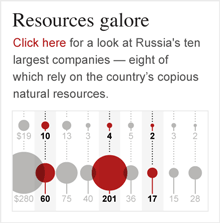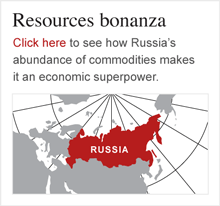Just how scary is Russia?
From Georgia to boardrooms, Russia is flexing its well-oiled muscles. The rest of the world is justifiably worried.
(Fortune Magazine) -- The Cold War was supposed to be history, a topic today's twentysomethings know about only from the classroom, not from doing duck-and-cover drills in elementary school, as their parents did. In the 17 years that have passed since the demise of the Soviet Union, any threat Russia posed had pretty much been relegated to defaulting on its debt.
But it's getting chilly again out there, isn't it? The world is coming to grips with Russia's response to an early-August attack on the disputed territory of South Ossetia by the former Soviet republic of Georgia. And it is clear that Moscow is baring its teeth in a way few thought ever to see again. Russia, stuffed to the brim with natural resources, was a country that the West had eagerly sought to bring into the global economy - as a partner.
The thought of Moscow resurfacing as an enemy seemed preposterous: Russia was minting dozens of globetrotting, free-market millionaires (see "Russia's Billionaire Boys Club"). Net inflows of foreign direct investment last year were about $10 billion, up from just $1.62 billion in 2004. The G-7, the developed world's richest club, had become the G-8, and world governments were hoping the next step for Moscow would be accession to the World Trade Organization.
After all, in the years since the Cold War, Russia emerged as a crucial trading partner for the rest of the world. Rising economies such as China can't get enough of Russia's raw goods. And Russian oil exports to the U.S. have almost doubled since 2004, rising to over 400,000 barrels per day of crude oil in 2007. (That's still a mere sliver of America's 20.7-million-barrels-per-day oil habit.) In the past ten years Europe's OECD members have increased their Russian crude imports from around 12% of total oil imports to about 29% in 2007. Its natural-gas dependency is even more pronounced: European countries bought 147.5 billion cubic meters of gas from Russia in 2007 - roughly 40% of all the gas Europe consumed. "Russia is consolidating its grip on the economic lifeblood of Europe," says Ariel Cohen, a senior research fellow at Washington's Heritage Foundation.
No wonder European lawmakers were frantic to ink a cease-fire between Russia and Georgia: Russia's bombers came within yards - purposefully, or was their aim bad? - of blowing up a critical oil pipeline that brings Central Asian crude across Georgia and eventually to Europe.
Indeed, it is no coincidence that Putin's military incursions are coming at a time of unprecedented economic strength for Russia. "We're at a moment in history," says one U.S. State Department official, "when Russia's economic confidence has risen to the level of its geopolitical anger [at] having to swallow everything the West wanted to do, like expand NATO and put missile defense in Poland. They've chosen Georgia as a line in the sand." (It isn't just the West that's a target of Moscow's zeal. See "How the KGB [and Friends] Took Over Russia's Economy.")
But the commodity-driven wealth masks continued financial weakness in Russia, which suffered a major currency crisis just ten years ago. In industry after industry, Russia has failed to create world-class competitors. American consumers, for example, could spend a whole day shopping and purchase only goods made in China. It would be hard, however, to find any consumer products manufactured in Russia. The $1.5 trillion economy simply lacks diversity: Calculations by Alfa-Bank, a Russian lender, show the oil and gas sector accounts for about 20.5% of Russia's overall GDP, roughly the same level as in 2000. According to IMF and World Bank estimates, oil and gas generate more than 60% of Russia's export revenues and account for 30% of all foreign direct investment in the country. The problem for Russia's resources-driven boom: Commodities fluctuate. Even with the rise of China and India, prices for what Russia sells are not going to be high forever.
Yet the global interdependence that gave rise to Russia's economy may also be the thing that pulls the bear back from its recent brutishness. Leverage is not a one-way street: The military conflict in Georgia spooked foreign investors, and they voted with their money in the immediate aftermath. Data released by Russia's central bank show a drop in foreign currency reserves of just over $16.4 billion, or about 3%, in the week beginning Aug. 8. It was one of the largest absolute weekly declines in ten years. Russia's press reported that some of the country's businessmen were worried that deteriorating relations with the West were exacerbating the tough global climate for credit. "Russia's Achilles' heel is that there is very little domestic long-term capital," says Kingsmill Bond, an analyst at Troika Dialogue, a Moscow-based investment bank.
That money comes from abroad - or used to, anyway. Given that fact, how likely is it that Russia's current leadership really wants a replay of the Cold War? Sure, the world depends on Russia for oil and gas and nickel and coal, but Russia desperately needs the world for markets and for capital. It's not the late '80s anymore: For all the chest thumping in Moscow over the fact that it can still intimidate a tiny neighbor, Russia's military might is but a shadow of what it once was; the "Eastern bloc" is history, and it's not coming back. It's 2008, and it's an interdependent world. Presumably, if they haven't already, a few of Russia's new capitalists will be reminding Vladimir Putin that the Cold War is over.
REPORTER ASSOCIATE Mina Kimes contributed to this article. ![]()
-
 The retail giant tops the Fortune 500 for the second year in a row. Who else made the list? More
The retail giant tops the Fortune 500 for the second year in a row. Who else made the list? More -
 This group of companies is all about social networking to connect with their customers. More
This group of companies is all about social networking to connect with their customers. More -
 The fight over the cholesterol medication is keeping a generic version from hitting the market. More
The fight over the cholesterol medication is keeping a generic version from hitting the market. More -
 Bin Laden may be dead, but the terrorist group he led doesn't need his money. More
Bin Laden may be dead, but the terrorist group he led doesn't need his money. More -
 U.S. real estate might be a mess, but in other parts of the world, home prices are jumping. More
U.S. real estate might be a mess, but in other parts of the world, home prices are jumping. More -
 Libya's output is a fraction of global production, but it's crucial to the nation's economy. More
Libya's output is a fraction of global production, but it's crucial to the nation's economy. More -
 Once rates start to rise, things could get ugly fast for our neighbors to the north. More
Once rates start to rise, things could get ugly fast for our neighbors to the north. More










